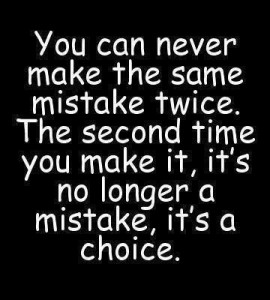I’ve Made The Same Mistake, AGAIN!
Still repeating the same self-defeating patterns?
Dating the wrong kind of man that you vowed to avoid three controlling jerks ago?
Putting off assignments or projects until the last minute, then making sloppy mistakes in a rush to meet deadline?
Sleeping late, not going to the gym, overeating… and then hating yourself for it?
On the surface, it makes no sense. Why would anyone keep shooting themselves in the foot when clearly they can see their toes smoking?
For the love of all that is holy, why oh why do I keep making the same mistakes over and over again!?”
Have you ever heard someone say that the definition of insanity is doing the same thing over and over again and expecting different results? Sure you have! You’ve probably said to yourself, “I must be crazy because this didn’t work the last time I tried it!” You’ve made the same mistake many times before and you’ve made it again. You even KNOW that it’s a mistake and you feel strongly you should have learned your lesson by now, yes? So why do you keep making the same mistakes over and over?
Many of us keep making the same mistakes over and over again and somehow we think that one day we’re going to miraculously reach that holy grail of life—happiness. In a perfect world, maybe that would be the case, but as you know the society we live in is far from perfect. There are simply too many things to do and not enough time to do them all.
All mistakes are not created equal, though. The kind of mistake you make reveals a lot more than you might realize.
The Four Kinds of Mistakes
One way to categorize mistakes is into these categories:
- Stupid: Absurdly dumb things that just happen. Stubbing your toe, tilting your plate while talking on your cell phone and your pizza slides to the floor or poking yourself in the eye with a banana.
- Simple: Mistakes that are avoidable but your sequence of decisions made inevitable. Having the power go out in the middle of your party because you forgot to pay the rent, or those plastic containers that you stuffed in the upper cabinet and slammed the door shut, falls on your face and hurts .
These mistakes are relatively easy, but shallow. When you understand what’s causing these mistakes and know what you need to do different, you should be able to avoid making these mistakes. You have to also recognize that sometimes, no matter what you do, once in a while you’re going to do stupid things. For instance, how many of us have been chewing too fast and bit our jaw. Then we turn right around and bite it again, and again. OMG!
These kinds of mistakes are not interesting and probably won’t have a great impact on the quality of your life once you correct them. Really, the kinds of mistakes you make define you. The more interesting your mistakes typically mean the more interesting your life is. If your biggest mistake is missing reruns of Scandal or Empire, you are not challenging yourself, and your life will always remain on the level that it currently is.
Learn from these stupid and simple mistakes, move on and spend your time learning from bigger mistakes. If you habitually or compulsively make stupid mistakes over and over again, then what you really have is an involved mistake. Let’s take a look at those kinds of mistakes:
- Involved: Mistakes that are understood but require effort to prevent. Regularly arriving late to work/friends, eating fast food for lunch every day, or when you get angry, you consistently speak before you think about what you are going to say.
- Complex: Mistakes that have complicated causes and no obvious way to avoid next time. Examples include making tough decisions that have bad results, relationships that fail, or other unpleasant or unsatisfying outcomes to important things.
The more complicated the mistake was, the more patient you need to be with yourself. The next mistake you’ll make is trying to fix something that you don’t understand, trust me, you’ll only make things worse. One of the biggest mistakes we, as parents, make is trying to fix a problem our child is having with their teacher before we understand what’s really going on. Before you try to fix a complex mistake, get as many different perspectives on the situation as possible. What’s your child’s story? What does the teacher say happened? What do some of his/her classmates say happened?
How do you stop this vicious cycle of making the same mistake over and over again?
- Identify the “mistake” you keep making over and over
What is it that’s not working for you in your life right now? Are you overeating? Maybe smoking or drinking more than usual? Are you spending more money than you can afford? What about your social life? Are you avoiding people who matter because you just don’t feel like yourself? Whatever it is that’s getting in the way of your happiness, you need to name it before you can deal with it. - Figure out what making the same mistakes over and over is doing for you.
We don’t always do the right thing, but rarely do we do random things. That means that whatever you’re doing that you need to stop, you’re doing for a reason. Do some soul searching to find out what that reason is. Are you overeating to fill an emotional void? Maybe you’re avoiding people because your self-esteem has seen better days? Again, whatever the answer is for you, bring it to light so that you can start dealing with it.
The Learning From Mistakes Checklist
- Accepting responsibility makes learning possible.
- Don’t equate making mistakes with being a mistake.
- You can’t change mistakes, but you can choose how to respond to them.
- Growth starts when you can see room for improvement.
- Work to understand why it happened and what the factors were.
- What information could have avoided the mistake?
- What small mistakes, in sequence, contributed to the bigger mistake?
- Are there alternatives you should have considered but did not?
- What kinds of changes are required to avoid making this mistake again? What kinds of change are difficult for you?
- How do you think your behavior should/would change in you were in a similar situation again?
- Work to understand the mistake until you can make fun of it (or not want to kill others that make fun).
- Don’t over-compensate: the next situation won’t be the same as the last.
So take a step back and ask yourself: Are you really learning from your mistakes? or Do you find yourself making the same kind of mistakes over and over again? If that’s the case, you may want to take some time to examine your attitude to see why you’re not learning from your mistakes.
Life is a lesson and until you learn that lesson, you’ll continue to make the same mistakes! What is life trying to teach you?



No comments yet.